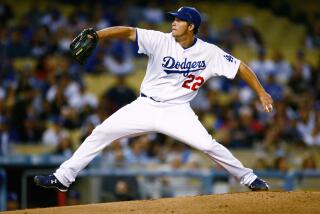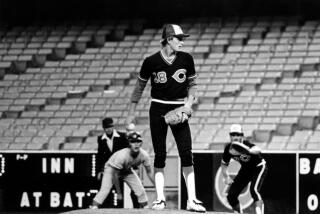Sudden Impact : Magnante Emerges From Obscurity to Become a Mainstay at UCLA
- Share via
Mike Magnante has piled up an 18-3 career record as a pitcher at UCLA. He is one of the top left-handers in college and likely will be snatched quickly in the June draft. But things weren’t always like this. There were times at Burroughs High and early in his UCLA career when people thought Magnante was an Italian word meaning, “That ball is outta’ here.”
In October, 1985, Magnante stepped onto a basketball court for a pickup game with his shirt flapping in the wind and stepped off the court with two major ligaments flapping in his knee. The impact of Magnante’s injury on the UCLA athletic department was of roughly the same magnitude as that generated by a kitten stomping its paws on shag carpet.
Magnante had pitched some junior varsity ball at UCLA and had seen very limited action at the end of the season with the varsity, but at that point, anyone who watched Magnante pitch and was reminded of Sandy Koufax probably also watches Benoit Benjamin and is reminded of Wilt Chamberlain.
“In high school I was the No. 1 pitcher, but we had some pretty bad teams,” Magnante said. “My senior year we won three games. I wasn’t a hard thrower and no one watched me. I never saw a scout at any of our games. I figured it was over after high school. I had no intention of trying to play beyond that.”
But his father talked him into trying out for the UCLA team, and Magnante was given a position on the JV roster and made his varsity debut in the spring of 1985.
After the knee injury, in which the anterior cruciate ligament and medial collateral ligament were badly torn, he redshirted his second year. When he left the team, Magnante was a mediocre college pitcher. But when he returned for the 1986 season after five months of intense, painful physical therapy, well, he was still a mediocre college pitcher. He did, however, pitch five strong innings near the end of the season against USC in a game that clinched the Pac-10 championship for the Bruins.
“During my recovery I wasn’t banking my whole life on baseball,” Magnante said. “I had no thoughts at all about playing professional baseball. I just didn’t think I was good enough. I wasn’t good enough. I was just so angry at myself for getting hurt that I felt I had to make it back.
“My father had told me over and over not to play basketball because I might get hurt. My coaches at UCLA told all of us the same thing. But I played anyway and I got hurt. I felt I owed it to myself to work my way back. But there was no thought of baseball beyond college.”
At the end of that season, with his knee fully healed, Magnante headed to Alaska for a summer of baseball against some of the finest amateurs in the country. It was in the Alaskan Summer League that Magnante the Overpowering first emerged.
“Throughout my career I had walked a lot of batters,” Magnante said. “At the very end of the season at UCLA, I got angry at myself and angry at my coaches and I went out to the mound mad at everything and said, ‘OK, let’s see if you can hit the fastball.’ And I just threw as hard as I could. It was the first time I’d ever done that. And they didn’t hit it.
“My confidence went way up. For the first time I felt like I could pitch at the major college level. When I went back to UCLA for the start of last season, it all carried over.”
In the first few weeks, UCLA pitching instructor Tip Lefebvre worked with Magnante on developing a curveball. Within a month he was throwing it consistently for strikes en route to a 4-1 record.
“What a difference the curveball made,” Magnante said. “I’d survived all that time with basically one pitch. After that, my confidence just kept building and building. Now, I feel I’m going to do great every time out.”
This season, Magnante has built a 10-2 record with 1 save and a 4.11 earned-run average in 15 starts and 4 relief appearances. He has thrown 3 complete games and has given up 84 hits in 88 innings.
“His strength is still that he has that good, live arm,” Lefebvre said. “He came here with a 75 mile-per-hour fast ball and has built it up to 86 and 87 miles per hour. And it’s a moving fastball. It sinks real well and sometimes seems unhittable. Now he’s got that real good curveball to go with it.
“It’s funny. I worked on him for two years and he didn’t make much progress, but one day he just had it all. It was just there, all of a sudden. The velocity, everything.”
Everything except a third pitch, which Lefebvre is teaching him now.
“We’re working on a screwball. If he learns to to throw it, he could be a real high prospect,” Lefebvre said. “I see him in the pros as a John Tudor or Bruce Hurst-type pitcher. But he throws harder than either one of them right now.”
The mere mention of pro ball makes Magnante smile. Talking about the major leagues is something to which he has not grown accustomed.
“Near the end of last season was the first time I ever dared to even think about pro ball,” he said. “I never could have imagined me playing pro ball before that. Now, I think about it. People have started telling me that I have as much talent as a lot of people in the major leagues; they’re just more consistent. Tip has gotten me to believe that.”
Lefebvre takes much satisfaction in having seen the growth from the mediocre walk-on who didn’t earn a scholarship until this season to the 22-year-old who attracts a large group of radar gun-toting scouts whenever he pitches.
“He’s just now starting to talk about pro ball,” Lefebvre said. “He had limited success until recently and he just didn’t believe he could do it. The kids who were all-stars in high school and then all-this and all-that, those kids were always tuned in to pro ball. Mike didn’t have great tools and then he had the knee injury and I know he just never thought about baseball as a profession. Now, he’s thinking it’s possible. He’s finally believing it.”
The most interest in Magnante has come from the New York Yankees, Montreal Expos, Kansas City Royals and Minnesota Twins. Magnante knows the numbers are against him. But numbers never scared him nearly as much as a big, hulking first baseman who crowded the plate and drooled at fastballs.
Magnante has built a 3.8 grade-point average as a mathematics major and is being considered for the NCAA academic All-American team and a post-graduate scholarship.
A scholarship that Magnante would like to use. In about 15 years.
“I guess I’m definitely going to get drafted and play somewhere next year,” he said. “I won’t spend 10 or 12 years in the minors, but I will give it my best shot for a few years.
More to Read
Go beyond the scoreboard
Get the latest on L.A.'s teams in the daily Sports Report newsletter.
You may occasionally receive promotional content from the Los Angeles Times.






